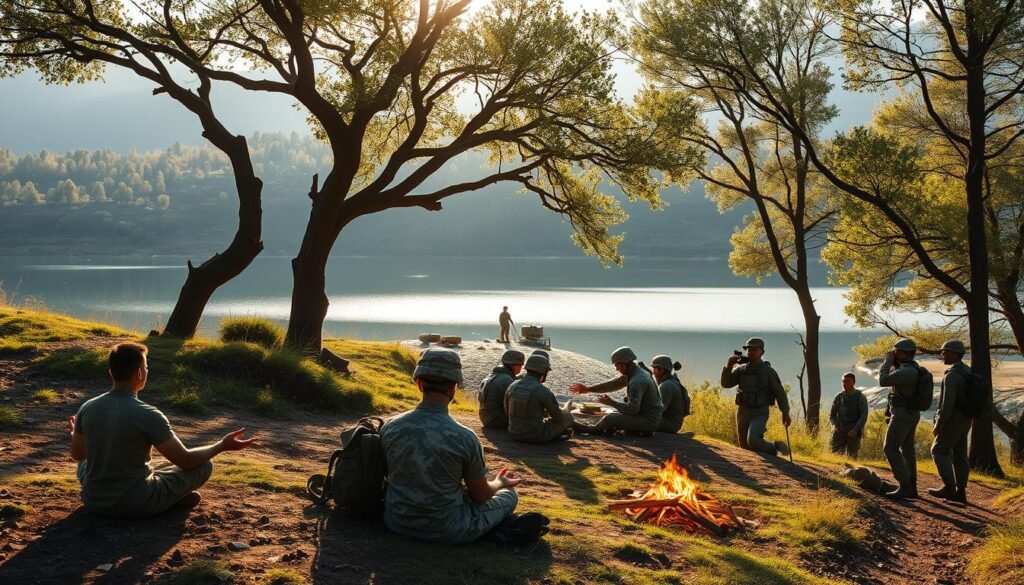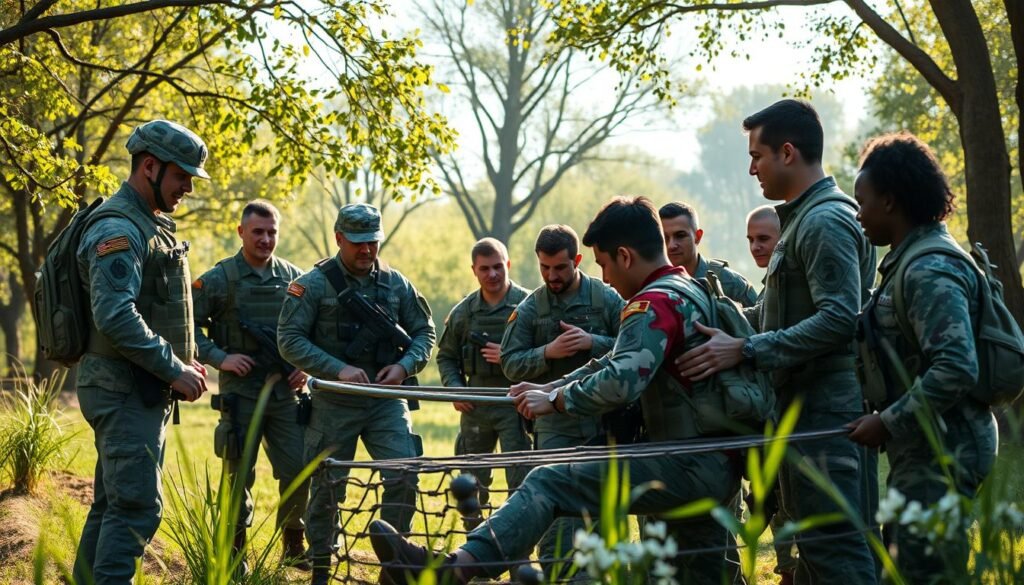Did you know that soldiers who follow structured recovery programs are 50% more likely to return to full duty? The concepts of soldier recovery, rest, and resilience are crucial. They help keep soldiers fit for missions and healthy in general. This guide is filled with tips to assist soldiers and their supporters in applying effective recovery strategies and boosting mental health support.
It’s crucial to understand how vital recovery care is. It helps service members face both psychological and physical challenges during and post-service. Recovery Care Coordinators are key. They create Comprehensive Recovery Plans that boost soldiers’ resilience and guide them to better health.
Rest is incredibly important; soldiers need 7 to 9 hours of good sleep every night for proper recovery. This guide offers various strategies and tips for soldiers to focus on their recovery and wellness. By following these, they will be strong, resilient, and ready for future challenges.
Key Takeaways
- Structured recovery practices enhance soldiers’ likelihood of returning to duty.
- Recovery Care Coordinators help develop Comprehensive Recovery Plans.
- Adequate sleep is crucial for optimal recovery during military service.
- Nutrition plays a vital role in physical performance and recovery.
- Strategies such as tactical breathing improve resilience and stress management.
- Flexibility and discipline are essential for adapting to unpredictable situations.
- Small personal routines can stabilize soldiers amid challenging times.
The Importance of Soldier Recovery and Resilience
The importance of soldier recovery is huge in today’s military setting. Resilience helps service members face the challenges of deployment and combat. It involves mental, physical, emotional, and behavioral strength to beat adversities, adapt, and grow from challenges. With more soldiers facing mental health issues, effective recovery methods are key. They help keep soldiers ready for duty and mentally healthy.
About 2.5 million US service members have served in Iraq and Afghanistan, and many are still there. Being away from home for long periods and facing tough experiences can cause serious mental health problems. This includes PTSD and issues with substance use. Resilience training is important for preventing such problems. According to the Army Comprehensive Soldier and Family Fitness program, it helps soldiers tackle these challenges positively, as part of a meaningful journey.
Research shows that resilient people are highly committed to their life and work. They have a lot of self-control and are open to change. The Soldier and Family Fitness Program focuses on improving strengths in five key areas: physical, emotional, social, spiritual, and family. Its goal is to build resilience within the military community, helping soldiers deal with life’s challenges.
Master Resilience Trainers (MRTs) are key in teaching resilience and performance skills in the Army. They provide the necessary tools for soldiers to succeed in difficult environments. By focusing on recovery and resilience, military leaders can greatly improve mental health outcomes for soldiers.
It’s important to know that not everyone who faces trauma gets mentally ill. Understanding this helps create a supportive military environment that boosts resilience. Early, evidence-based interventions can lead to healing and growth, supporting long-term mental health in the military.
To learn more about effective leadership strategies for resilience training, click on this link.
| Study/Program | Focus | Key Benefits |
|---|---|---|
| Bertone’s Study (2006) | Resilient Individuals | High life commitment, self-control, openness to change |
| Army CSF2 Program | Resilience Skills | Enhances physical, emotional, social, spiritual, and family strength |
| Master Resilience Trainers | Coaching Resilience | Subject matter expertise in resilience and performance enhancement |
Understanding Behavioral Health Issues in Soldiers
Behavioral health problems greatly affect soldiers and the military community. About 20% of veterans face PTSD or depression, stressing the need for mental health support. Veterans are at higher suicide risks than non-veterans, marking a vital intervention area.
The VA delivers various mental health services to help those in need. Treatments like cognitive-behavioral therapy and eye movement desensitization are key for veteran care. Emergency services like hotlines are crucial for post-traumatic stress disorder (PTSD) prevention and stopping suicides.
Lifestyle changes can aid in mental health improvement. Activities such as exercising, eating well, and sleeping enough can boost mood and lower anxiety. Support groups and programs also provide valuable mental health support for veterans.
A significant 17% of the military is medically unfit due to both physical and mental health issues. The rate of behavioral health disorders climbed from 9.4% in 2007 to 15% in 2014. In that year, these issues led to around 80,000 hospital stays and one million medical visits.

It’s important to identify soldiers at higher risk early. Being male, white, junior enlisted, or having prior mental health issues increases risk. Shockingly, 50% of Army suicides have early signs of mental health problems.
The Army’s Corrective Action Plan aims to improve diagnosis and treatment. It includes leadership-driven prevention efforts to lower suicides and build resilience.
Effective Strategies for Recovery, Rest, and Resilience in Soldiers
Good recovery, rest, and resilience strategies for soldiers focus on overall health. They address the body, mind, and emotions to give complete support. Recovery Care Coordinators are key in this. They provide active help and custom recovery plans.
Promoting Holistic Wellness
For soldiers’ well-being, holistic wellness is vital. It includes:
- Creating Comprehensive Recovery Plans based on each soldier’s needs.
- Using energy management techniques to avoid burnout and encourage self-care.
- Building healthy relationships and support groups to lessen loneliness.
Dr. Gloria Park highlights the importance of self-care, like “Hunt the Good Stuff”. It helps soldiers stay positive. Emotional intelligence boosts resilience and wellness.
Physical and Mental Health Balance
It’s key for soldiers to balance their physical and mental health. Here’s how:
- Join regular physical rehab programs to get back strength and movement.
- Practice mindfulness to lower stress and improve mental focus.
- Use the Global Assessment Tool (GAT) to keep track of mental fitness. It helps identify strengths and growth areas.

The Comprehensive Soldier Fitness Program says resilience grows with learning and practice. This program covers physical, family, social, emotional, and spiritual fitness. It prepares soldiers to handle challenges in service and civilian life.
Combat Stress Management Techniques
Managing stress is crucial for soldiers facing the mental challenges of military life. Various techniques can help ease combat stress symptoms. This allows soldiers to concentrate on their duties and maintain their health. Techniques like breathing exercises, visualization, and positive self-talk can greatly lower anxiety levels. This improves performance in stressful situations.
It’s important to have stress control plans in place. This creates an environment where soldiers feel ready for their service demands. Having regular meals, sleep, and exercise routines supports mental health. Adults should sleep seven to nine hours per night to fight stress effectively.
When stress levels spike, soldiers have many resources. These include:
- Military OneSource for 24/7 confidential non-medical counseling services.
- Health and wellness coaching available for service members and their families at no cost.
- Military Crisis Line at 988, which provides immediate support during a crisis.
Knowing the difference between combat stress and PTSD is key. Combat stress is usually short-term, fading in weeks or months. PTSD, however, is more serious and requires intensive care. It comes with symptoms like recurring dreams or flashbacks, needing strong mental health support.
Negative stress symptoms include sleep problems, irritability, anxiety, and trouble focusing. Recognizing these signs helps soldiers get help quickly. During deployment, combat stress control teams provide mental health support. They help soldiers manage their stress effectively.
These methods and resources aim to boost soldiers’ resilience. They ensure soldiers get the mental health care they need for their well-being and readiness.
The Role of Leadership in Building Resilience
Strong leadership is crucial in building resilience among soldiers. It helps create a space that supports mental health. Leaders use servant leadership to understand and meet the needs of their teams. This builds trust and teamwork.
Servant Leadership Principles
Servant leaders put the growth of their team first. They make sure the needs of the team are the priority. This not only builds resilience but also strengthens the sense of community. Servant leadership is shown through:
- Empathy: They understand and support soldiers personally.
- Listening: They value feedback and keep communication open.
- Stewardship: They are committed to their team’s well-being.
Self-Awareness Among Leaders
Being self-aware is key for leaders. Knowing their strengths and limits lets them adjust to their team’s needs. This is vital in high-stress environments like the military. Self-aware leaders:
- Spot stress in their teams early to help in time.
- Better communication leads to more trust and teamwork.
- They turn stress into opportunities for growth.
Leaders who reflect on their actions encourage resilience. This improves the team’s ability to overcome challenges and perform better.

| Leadership Principle | Description | Impact on Resilience |
|---|---|---|
| Empathy | Understanding the emotional needs of team members. | Reduces feelings of isolation during stressful situations. |
| Listening | Encouraging open dialogue to address concerns. | Builds trust and strengthens collaboration. |
| Self-Regulation | Managing one’s own emotions and reactions. | Enhances stability in high-pressure scenarios. |
| Mental Agility | Adapting to changing circumstances and challenges. | Promotes proactive problem-solving and resilience. |
| Strength of Character | Demonstrating core values and integrity. | Inspires confidence and commitment within the team. |
Formal Training Methods for Resilience Building
The U.S. Army focuses a lot on training for resilience. They see it as key to making soldiers mentally stronger. The main program for this is the Master Resilience Training Course. It teaches important skills through resilience training programs. Soldiers learn ways to handle stress better.
A tool called the Global Assessment Tool (GAT) is really helpful. It lets soldiers check their mental health. It points out their strengths and what they need to work on. This helps them get better at dealing with stress. They practice resilience in safe training scenarios. This makes them ready to face real stress.
Research shows this kind of training works. Looking at 28 studies, five had strong results. They say mixing different approaches like thought therapy and mindfulness helps a lot. So, ongoing study is key. We need to keep finding the best ways to support soldiers’ mental health. This way, they’re ready for anything.
| Study Focus | Findings |
|---|---|
| Resilience Outcomes | Five out of eight interventions built resilience. |
| Post-Traumatic Stress Symptoms | Two out of eight studies showed significant reductions. |
| PTSD Caseness | Mixed evidence on interventions reducing clinical diagnoses. |
| Risk of PTSD Diagnosis | The control group showed 6.9 times higher risk than the intervention group. |
| Therapeutic Modalities Used | Cognitive behavioral therapy, biofeedback, and psychoeducational programs. |
Resilience training is crucial for soldiers’ readiness. Mixing the Master Resilience Training Course with tools like GAT builds a strong mental health culture. This improves their effectiveness on missions.
Innovative Approaches to Physical Rehabilitation
New methods in physical rehab are key for effective injury healing in soldiers. Adding mental health care to these methods improves results. It deals with both body and mind recovery. For soldiers, healing their injuries also means taking care of their emotional health.
Injury Recovery and Psychological Healing
Injuries can shake a soldier’s mental strength, often leading to PTSD. Many with PTSD don’t fully get better with just current therapies. Combining physical rehab and mental health support creates a healing space. The Canadian Armed Forces (CAF) has a rehab program. It gives mental and spiritual health services too. This method helps soldiers heal better from their injuries.
Restoration of Confidence After Injury
Getting confidence back after an injury means rebuilding how soldiers see themselves and believing in their bodies again. Programs that support both body and mind help soldiers deal with their feelings about their injuries. Capt Trevor Green, who was badly hurt in his brain, shows how it works. He got better at the Halvar Jonson Centre for Brain Injury Rehabilitation in Ponoka, Alberta. This shows how helpful teamwork and support are in rehab. They speed up healing and boost soldiers’ self-esteem.
Soldiers in rehab also benefit from learning about natural remedies to improve adrenal health. Knowing how the mind and body connect is crucial to recovery. This highlights why we need new methods that focus on both physical and mental healing.
Reintegration Programs for Returning Soldiers
Reintegration programs are key for soldiers coming back to civilian life. These programs help with readjustment and finding jobs. The Yellow Ribbon Reintegration Program (YRRP) is one such program. It helps National Guard and Reserve members. It provides mental health support and resources during the deployment cycle. It’s designed to make reintegration smoother.
The YRRP offers events both online and in person. These events meet the needs of soldiers and their families. Many soldiers don’t live close to military bases, so getting to behavioral health resources is crucial. The program helps them become part of their communities again. It makes sure soldiers can adapt to life after serving.
Since starting, over 80,000 soldiers have used the Army Recovery Care Program (ARCP). This program is vital for helping soldiers who are wounded or injured. It gives them a detailed recovery plan. This covers their career, health, social life, family, emotions, spiritual needs, and resilience. These efforts are key in dealing with mental health issues that many veterans face. In fact, up to 42% of National Guard veterans need treatment for these issues.
Getting involved in programs like YRRP gives immediate access to behavioral health resources. It also helps soldiers talk about what they need. This lessens the stigma of seeking help. With help from groups like the U.S. Department of Veterans Affairs, these programs provide ongoing support. They help soldiers and their families as they transition.
When soldiers return to civilian life, finding a good job and facing social stigma can be tough. Knowing about and using these resources can make a big difference. With support and a focus on coming back into civilian life, these soldiers can tackle their challenges. This helps them be resilient and well.
| Program | Focus Area | Approach | Target Group |
|---|---|---|---|
| Yellow Ribbon Reintegration Program (YRRP) | Deployment Support | In-person and Virtual Events | National Guard & Reserve |
| Army Recovery Care Program (ARCP) | Wounded Soldier Care | Comprehensive Recovery Planning | Wounded, Ill, and Injured Soldiers |
| Remote Medical Management (RM2) | Community Medical Support | Local Treatment Management | Army National Guard & Reserve |
Conclusion
The road to resilience and effective recovery for soldiers is complex yet crucial in today’s army. Significant challenges in military mental health need strong support systems and resilience strategies. Studies show that resilience training boosts motivation and helps manage stress better.
This training is promising for helping soldiers see stressful things in a positive light. It speeds up recovery from stress and injuries. Understanding the importance of overall wellness and informed leadership can make a big difference in soldiers’ lives.
Programs that boost resilience are really helpful for young military leaders. They help them deal with stress better and reduce negative effects on their mental health. Resilient people generally have higher self-esteem, are better at solving problems, and have stronger relationships. This supports using resilience training in military programs.
To sum up, focusing on these principles makes the military more adaptable and resilient. It also creates a culture of well-being with wide effects on how well the military operates. As the military tackles soldier recovery and mental health challenges, using proven strategies is more critical than ever.